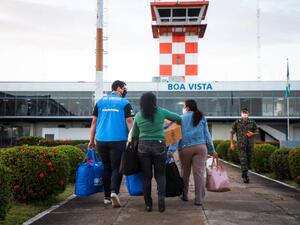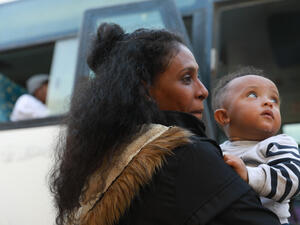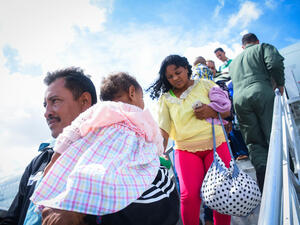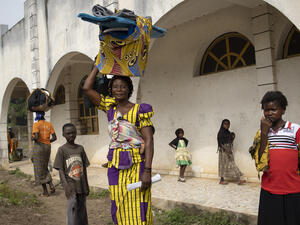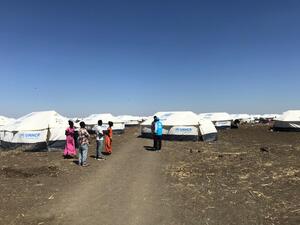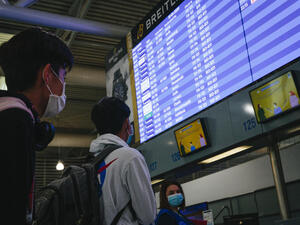Transfer of refugees from squalid Jalozai camp set to begin as UNHCR's top official in Afghanistan arrives in Kabul
Transfer of refugees from squalid Jalozai camp set to begin as UNHCR's top official in Afghanistan arrives in Kabul
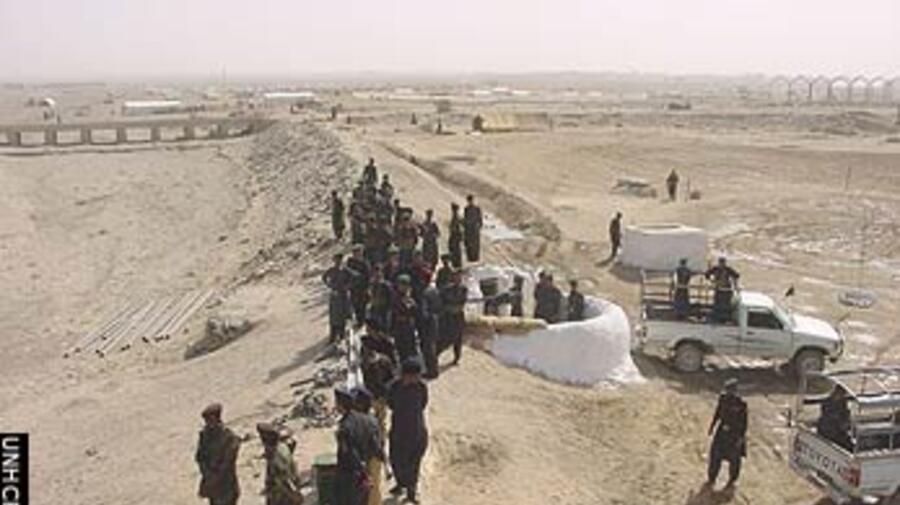
Pakistani Frontier Corps border guards at the Chaman crossing point were pelted with rocks over the weekend by Afghans desperate to cross the frontier.
PESHAWAR, Pakistan, Nov. 18 (UNHCR) - In what United Nations officials hope will mark the beginning of the end of perhaps the most squalid refugee camp in Pakistan, UNHCR is scheduled to transfer some 500 Afghans Monday from the Jalozai camp near the northern city of Peshawar.
The scheduled transfer follows an agreement reached Saturday with authorities from Pakistan's North-West Frontier Province, who also agreed to allow the refugee agency to provide aid to non-Pashtun Afghans who settled outside the Jalozai camp. Those refugees were reluctant to move into the camp itself, which is located in a Pashtun tribal area.
In an important step for the return of the agency's international staff to Afghanistan, UNHCR's Chief of Mission, Filippo Grandi, returned to Kabul Saturday along with other senior United Nations officials. Additional UNHCR staff members are scheduled to arrive in the country over the next few days to resume the agency's work, which was largely but not totally interrupted following the September 11 terrorist attacks on the United States.
Grandi met with the local staff in Kabul, including four Afghan women who were barred from working for five years by the Taliban. While UNHCR offices in Herat and Kabul have re-opened, the status of the offices in Kandahar and Jalalabad remains unclear. The office in the northern city of Mazar-i-Sharif was completely looted and a new facility must be found.
The transfer of refugees from Jalozai to Kotkai in Bajaur tribal agency some 120 kilometres north of Peshawar is scheduled to start early Monday and will continue as long as UNHCR can find people willing to make the trip. The camp, which can house up to 20,000 people, is already equipped with tents, latrines, and water bladders. One truck and 13 buses will be used to move the refugees.
About 500 people are expected to be moved Monday, according to UNHCR officials, who said the dusty, treeless site becomes very cold at night and extremely hot during the day.
"During a recent visit to the site, UNHCR officials were beseeched by refugees asking for aid," the agency said in a statement Sunday. "Many were sleeping in 'tents' stitched together from pieces of clothing and plastic bags and supported by sticks."
The weekend saw more security problems at the Makaki camp inside Afghanistan near the border with Iran. Aid workers reported that a man was shot near the camp, which was the scene of the fatal shooting of a 12-year-old boy last week. The injured man received emergency treatment at the camp before being transferred to a hospital in the Iranian border town of Zabol.
"UNHCR has repeatedly raised its concerns for the safety of Afghans in Makaki camp," the refugee agency said.
The camp, opened about a month ago and believed to be currently housing some 5,000 people, is run by the Iranian Red Crescent Society. There have been reports that armed Talibans are present among the more than 5,000 displaced people at the camp.
Iranian authorities last week transferred more than 4,000 people from Makaki and its surrounding area to Mile 46, a second camp for displaced Afghans located about 50 kilometres south of Makaki, also inside Afghanistan.
International aid workers at Mile 46 are worried about the water and sanitation conditions in the camp, and report a high prevalence of malnutrition among children under five years of age.
Meanwhile, relocations from the Killi Faizo staging site at the Chaman border crossing in Pakistan continued at a steady pace over the weekend, UNHCR reported. The agency said it transferred 1,445 refugees Saturday from the site to what it considers the safer Roghani camp further inland. The Roghani site now shelters 3,168 people, not including those relocated on Saturday.
The refugees made the trip in a fleet of 18 extravagantly decorated buses and 19 trucks adorned with chimes. Even as they were being moved to Roghani, more Afghans continued to enter Pakistan in the Chaman area. The new arrivals, some 480 persons, came mainly from Kandahar, Ghazni, Uruzgan, and Herat.
Some 300 people who were waiting most of the day on the Afghan side of the frontier pelted Pakistani Frontier Corps guards with rocks Saturday afternoon before surging across the border to the edge of the Killi Faizo site. In another incident, Taliban soldiers who are still present in the Afghan border town of Spin Boldak tried to control hundreds of Afghan men, women and children trying to reach Killi Faizo.

